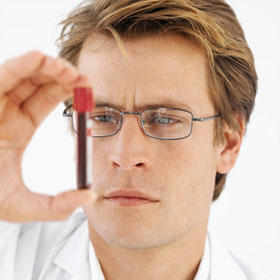Blood tests help reduce biopsy after transplantation
According to a study published April 22, a blood test to analyze gene activity could help heart transplant patients avoid many inconveniences caused by invasive biopsy.
Currently, biopsy is still a popular method to monitor whether the immune system has a new organ excretion.
This new study shows that patients who are monitored for elimination through maternal rejection have the same results for patients with regular cardiac biopsies. This mamma method called AlloMap was developed by XDx, a private company based in Brisbane, California.
 Dr. Michael Pham, assistant professor of cardiology at Stanford University and chair of this research project, said: 'I think this will make a big change to our vision of surveillance. rejection after transplanting. '
Dr. Michael Pham, assistant professor of cardiology at Stanford University and chair of this research project, said: 'I think this will make a big change to our vision of surveillance. rejection after transplanting. '
However, the authors of this study concede that this new type of testing is not sufficient to make professional conclusions. However, it also eliminates the case of transplant surgery patients at high risk of elimination in the past.
The new study, sponsored by XDx on April 22, was first published in Chicago during the International Heart and Lung Transplant Association (ISHLT) annual meeting and posted on the magazine's online news website. "The New England Journal of Medicine".
Despite immunosuppressive drugs, about one-fourth of transplant patients suffer from rejection symptoms in the first year after transplantation. While such symptoms may be treated with medication, they may experience heart damage, especially if treatment is not started early enough to prevent this problem. In some cases, excretion symptoms can cause death.
Some transplant centers have conducted routine biopsies once a week after transplantation and every few months in subsequent years. During a biopsy, the doctor will insert a small tube into the neck vein and thread a steel fiber to the heart to hold a small amount of heart tissue to conduct a examination under a microscope.
Dr. John A. Jarcho, Deputy Director of The New England Jourrnal, said the Western medical community is currently working to develop less invasive methods to better monitor the elimination process to replace the still-old method. Convenient and painful for patients, including the use of imaging diagnostics and AlloMap. These two methods have been approved for use by the US Food and Drug Administration since 2008. However, this is the first time such a technique has become a formal test method to bring good results. most for patients.
However, AlloMap is a good example of complex and expensive tests - costing up to $ 3,000 each - using gene technology but it is 'more economical' than biopsy. Classic if not for the convenience of patients and professionally effective. This method helps analyze the level of activity of 11 genes and calculates parameters that only help determine the possibility of possible rejection in the body.
AlloMap was conducted on 602 patients in 13 organ transplant centers in the US. These people received transplants from about six months to a year ago. The study divided these patients into two groups. The first group was periodically biopsied using the old method while the other group was conducted in a new way AlloMap with the same time period. Finally, AlloMap gives the same results with the old method.
Dr. Pham said, it is worth noting that the AlloMap gene test is cheaper than the biopsy method, which costs up to $ 4,000-5,000 for each procedure.
- Biopsy: A test helps you diagnose cancer
- What blood tests can you know about?
- Things to know about general blood tests
- Find the safest cancer test method ever
- Early detection of all cancers with a single blood test
- Ultra-fast blood tests with new equipment
- Blood tests can detect Alzheimer's disease
- Liquid biopsy: The dream of the world's most prominent oncologist
- Blood tests help detect Alzheimer's disease
- Successfully developed a new blood test
- Blood test method helps detect cancer 5 years early
- Clinical significance index of medical tests
 Green tea cleans teeth better than mouthwash?
Green tea cleans teeth better than mouthwash? Death kiss: This is why you should not let anyone kiss your baby's lips
Death kiss: This is why you should not let anyone kiss your baby's lips What is salmonellosis?
What is salmonellosis? Caution should be exercised when using aloe vera through eating and drinking
Caution should be exercised when using aloe vera through eating and drinking